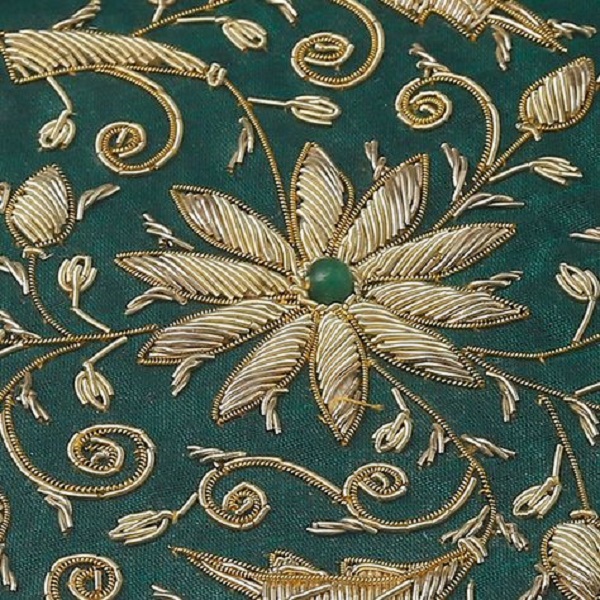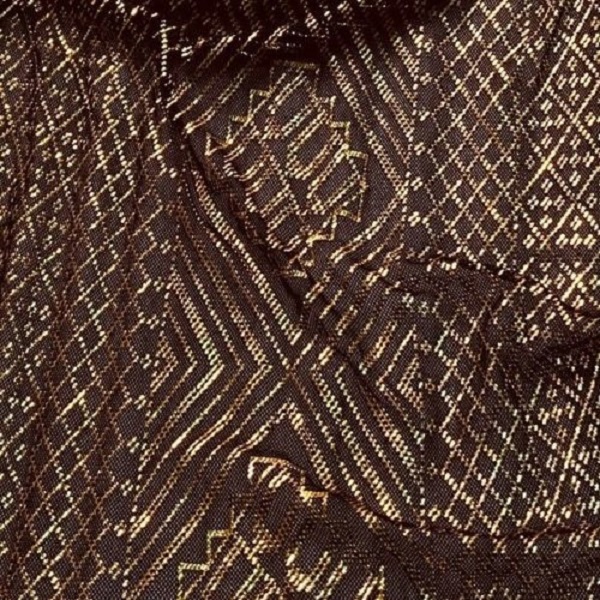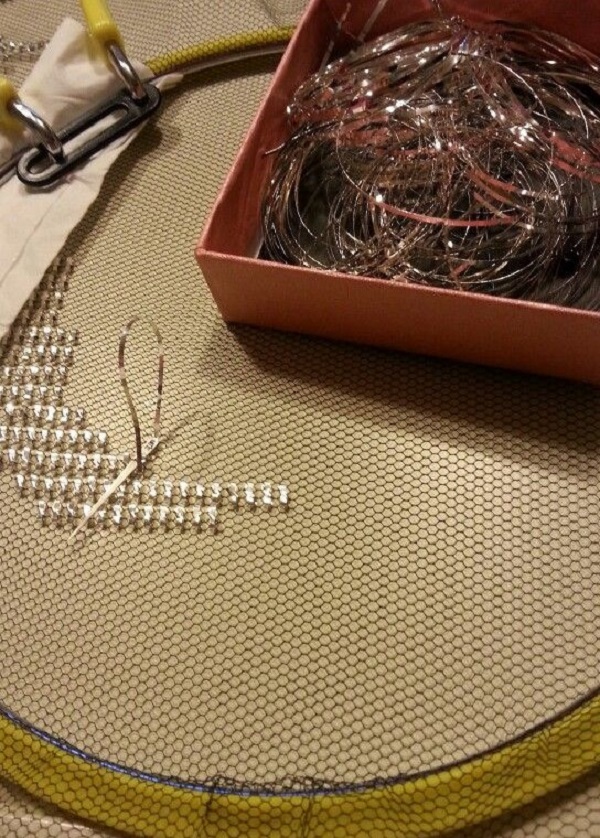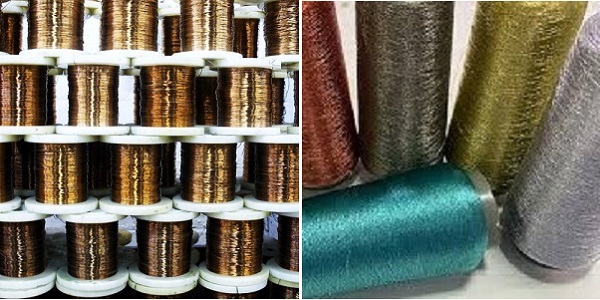The diversity of the Arab world- stretching from Mauritania to Syria to Oman and Somalia – means
Metal Thread Embroidery is described in a variety of names and terminology, depending on the region and style. As these distinct regions function within the cultural meta-system of the 'Arab World', techniques, materials and designs blend and influence each other. In this first article in our series, we look at all the various influences and styles, as well as the history and context in which metal thread embroidery is used in and around the Arab world.
tur_bi_tallī also known as
tulle_bi_talli
Tūlle_bi_tallī: (French: Tulle – a city in France where fine material for veil was first made; Turkish: tel – wire; Synonym: tariq; talli; badla; khus_dozi ), series of small metal knots made on a woven net ground as embellishment. The term is commonly used in the North African Arab region specifically in Egypt.
or asīūṭī,
Metal Threads (Zari
Zarī: (Persian two-syllables: zar: gold & dozi: embellishment), complex embroidery technique that uses metal alloy on silk, satin, or velvet, and may include pearls, beads, and precious stones. Colloquially in the Arab gulf region, the term (zarī) is loosely applied to any gilded thread, embellishment or gilded brocade fabric. Originated in ancient Persia it has been used extensively in Indian and Middle Eastern textiles for centuries. )
Historically, metal thread embellishment has been used extensively throughout the Middle East, Asia, and parts of Europe. Even in the Bible, we find references to its use with Egyptian linen. In the museum of Monbijou Palace in Berlin, 3,000‑year‑old specimens of netting made with flax are still preserved.
Forms of metal embellishments appeared in Egypt, Ottoman Turkey, India, and Central Asia, but in each country, it adopted a different form and is known by a different name. People from all walks of life, from royalty to laymen were and continue to be fascinated by the use of gold and silver threads.
Precious Metals
Literature reveals that gold and silver metallic coils are drawn through a series of dies to obtain a fine thread. The technique traditionally started with slabs of metal melted, beaten into thin plates, and divided into small slips which were rounded by a hammer before it was filed to form wire. Another technique was slabs of metal melted and pierced through steel sheets and hammered flat to the necessary fineness to create 2-3 mm thick metallic straw.
Precious metals such as silver or gold were first used but in time this was substituted by metal alloys plated in silver or gold, and today we have mass produced tinsel versions in a multitude of lustrous colours. The wire format is used in embroideries such as
Zardozi
Zārdozī ( Persian: zar: gold, dozi: embellishment, synonyms: asūṭī, tallī,tur_bi_tallī/tulle_bi_talli, mnaqad/mnaghad,mukaish, badla/badlah, fardi, khus_dozi). Metallic thread embroidery.,
Sarma
Ṣarma: (colloquially). Perhaps the word comes from the verb “sarama” meaning the piece of rope. Sarma: a kind of dense embroidery that is done with golden or silver threads in a way that completely covers the fabric, adding to it luxury and splendor. The embroidery is often three-dimensional, with a cotton padding wrapped in golden threads to create the height to the overall shape of the embroidery. Historically, Damascus was famous for it. It is believed that its origin is from India, and its name there is Sharma, then it moved to many countries, including Turkey, and its name there is Sirma
Sirma: (Byzantine Greek: súrma – a dragging motion, from Ancient Greek: súrō – to draw; Synonym: Tel_sirma
Tel_sirma: (Ottoman Turkish: tel – wire, thread, chord; Byzantine Greek: súrma – a dragging motion from Ancient Greek: súrō – to draw; Synonym: Sirma), a metal lace or thread traditionally made of silver or gold and sometimes even copper often used textile embellishments such as embroidery and weaves like brocades. ), a metal lace or thread traditionally made of silver or gold and sometimes even copper often used textile embellishments such as embroidery and weaves like brocades. , while in Algeria the name is Majboud., and
Mukaish
Mukaish (Indian, synonyms: asūṭī, tallī, tur_bi_tallī/tulle_bi_talli
Tūlle_bi_tallī: (French: Tulle – a city in France where fine material for veil was first made; Turkish: tel – wire; Synonym: tariq; talli; badla; khus_dozi ), series of small metal knots made on a woven net ground as embellishment. The term is commonly used in the North African Arab region specifically in Egypt.
, mnaqad/mnaghad, mukaish, badla/badlah, fardi, khus_dozi). Indian embroidery technique where small rectangular strips of metal are squeezed shut around some threads of the fabric creating intricate shapes and designs. (those are in flat straw form) where the wires can be stitched into a variety of patterns and motifs.
Due to the industrial revolution and the invention of the electroplating process, imitation techniques were developed to avoid the cost of precious metals. As copper is the most malleable and ductile metal after gold and silver, silver electroplated copper wire replaced pure silver. Various modern colours and chemicals are used to impart multiple shades of golden hue to these threads to imitate pure gold.
Examples of modern day
zari
Zarī: (Persian two-syllables: zar: gold & dozi: embellishment), complex embroidery technique that uses metal alloy on silk, satin, or velvet, and may include pearls, beads, and precious stones. Colloquially in the Arab gulf region, the term (zarī) is loosely applied to any gilded thread, embellishment or gilded brocade fabric. Originated in ancient Persia it has been used extensively in Indian and Middle Eastern textiles for centuries. or imitation metal threads
Gilded Threads
Due to the growing demand for precious metals and copper used in various modern industries, this option became expensive as well. Thus, a cheap and durable alternative was invented. Metallic
zari
Zarī: (Persian two-syllables: zar: gold & dozi: embellishment), complex embroidery technique that uses metal alloy on silk, satin, or velvet, and may include pearls, beads, and precious stones. Colloquially in the Arab gulf region, the term (zarī) is loosely applied to any gilded thread, embellishment or gilded brocade fabric. Originated in ancient Persia it has been used extensively in Indian and Middle Eastern textiles for centuries. (gilded thread) came into vogue replacing traditional metals like gold, silver, and copper. This modern
zari
Zarī: (Persian two-syllables: zar: gold & dozi: embellishment), complex embroidery technique that uses metal alloy on silk, satin, or velvet, and may include pearls, beads, and precious stones. Colloquially in the Arab gulf region, the term (zarī) is loosely applied to any gilded thread, embellishment or gilded brocade fabric. Originated in ancient Persia it has been used extensively in Indian and Middle Eastern textiles for centuries. , or imitation metal thread, is lightweight and more durable than earlier editions and it is resistant to tarnishing and knotting.
Zari
Zarī: (Persian two-syllables: zar: gold & dozi: embellishment), complex embroidery technique that uses metal alloy on silk, satin, or velvet, and may include pearls, beads, and precious stones. Colloquially in the Arab gulf region, the term (zarī) is loosely applied to any gilded thread, embellishment or gilded brocade fabric. Originated in ancient Persia it has been used extensively in Indian and Middle Eastern textiles for centuries. is made when copper wires are drawn from copper alloys and electroplated with silver before it is wound around a, usually cotton, base yarn and reeled. This type of gilded thread
zari
Zarī: (Persian two-syllables: zar: gold & dozi: embellishment), complex embroidery technique that uses metal alloy on silk, satin, or velvet, and may include pearls, beads, and precious stones. Colloquially in the Arab gulf region, the term (zarī) is loosely applied to any gilded thread, embellishment or gilded brocade fabric. Originated in ancient Persia it has been used extensively in Indian and Middle Eastern textiles for centuries. is less expensive than pure metal thread
zari
Zarī: (Persian two-syllables: zar: gold & dozi: embellishment), complex embroidery technique that uses metal alloy on silk, satin, or velvet, and may include pearls, beads, and precious stones. Colloquially in the Arab gulf region, the term (zarī) is loosely applied to any gilded thread, embellishment or gilded brocade fabric. Originated in ancient Persia it has been used extensively in Indian and Middle Eastern textiles for centuries. , as silver electroplated copper is more economical.
Zardozi
Zārdozī ( Persian: zar: gold, dozi: embellishment, synonyms: asūṭī, tallī,tur_bi_tallī/tulle_bi_talli, mnaqad/mnaghad,mukaish, badla/badlah, fardi, khus_dozi). Metallic thread embroidery. produced in India
The Indian Sub-continent
Metal thread embroidery has been around in the Indian subcontinent since the Rig Veda era (1500 BCE) and went on to prosper during the Mughal period (1526 - 1857). This kind of art goes back in history and is associated with famous Vedic texts, such as the Ramayana and the Mahabharata.
Initially, real silver and gold were used to make these threads. Craftsmen have different ways of polishing the thread to make it appear brighter and include a huge spectrum of colours including silver metallic, gold metallic, and
rayon
Rayon: a semi-synthetic fabric made from cellulose fibers derived from wood pulp. It was first produced in the late 19th century as an alternative to silk. Rayon became popular due to its softness, drapability, and affordability, and it is used in a wide range of clothing and home decor applications. metallic.
Surat, in Gujarat, is the biggest metallic thread manufacturer in India with several distributors selling these threads on a large-scale basis across the country and continues to be the major exporter of raw materials, especially to the Arab Gulf region
The many different names and styles of metal thread embroidery
Terminology
Metal thread embroidery techniques can be divided into three categories
- Surface embroidery, where the metal threads are applied on top of the fabric, such as couching
Couching: (Latin: collocare – Place together), in needlework and embroidery couching is a technique in which yarn or other materials are laid across the surface of the ground fabric and fastened in place with small stitches of the same or a different yarn
- Woven embroidery, where the metal thread is threaded through the fabric and becomes part of the structure of the fabric, known as brocade
Brocade: (Italian: brocco – twisted thread), is a richly decorative fabric woven with an intricate raised pattern. Its origins can be traced back to ancient China, where it was made for the imperial court. It later spread to Europe during the Renaissance and became popular in couture and decorative arts.
- Applied embroidery, where the metal thread is used to create a notion or embellishment that is applied to a garment as decoration.
Metal threads and metal thread embroidery is named using different terms and terminology in different parts of the world.
Talli
Tallī: (Turkish: tel – wire, string), Gulf Arab – a woven braided trimming made with metal wire, threads and ribbons often sewn on detachable panels used as embellishments. Other – (Synonym: tulle_bi_talli
Tūlle_bi_tallī: (French: Tulle – a city in France where fine material for veil was first made; Turkish: tel – wire; Synonym: tariq; talli; badla; khus_dozi ), series of small metal knots made on a woven net ground as embellishment. The term is commonly used in the North African Arab region specifically in Egypt.
; tariq; badla; khus_dozi), series of small metal knots made on a woven net ground as embellishment.
as we define it in our Digital Dictionary is a term believed to originate from Arabic: talā’ or talā: paint or to coat, or from Turkish: tel: wire. It generally refers to metal alloys coated with silver or gold, to create either flat straws or coil threads that are then applied on clothing in varying patterns. There is a huge spectrum of terms and variances that are used depending on location:
- tur_bi_tallī/tulle_bi_talli
Tūlle_bi_tallī: (French: Tulle – a city in France where fine material for veil was first made; Turkish: tel – wire; Synonym: tariq; talli; badla; khus_dozi ), series of small metal knots made on a woven net ground as embellishment. The term is commonly used in the North African Arab region specifically in Egypt.
, asīūṭī,
- mnaqad/mnaghad
Mnaghad: (Arabic: mnaqad: with coins, synonyms: mnaghadah
Mnaghadah: (Arabic: mnaqad: with coins). Since silver was a form of currency, it came to refer to silver adorned garments. The term refers to articles decorated with silver (tallī) straw (khūs) in small coin-like dots. In the Arab Gulf region, the terms (mnaghadah), (mnaghad) (nighdah) and (tallī) are often used interchangeably, with the (qāf) pronounced (gha) colloquially., naghdah
Naghdah: (Arabic: mnaqad: with coins, synonyms: mnaghadah, mnaghad, mnaghadah). Since silver was a form of currency, it came to refer to silver adorned garments. The term refers to articles decorated with silver (tallī) straw (khūs) in small coin-like dots. The (qāf) is pronounced (gha) colloquially., mnaghadah
Mnaghadah: (Arabic: mnaqad: with coins). Since silver was a form of currency, it came to refer to silver adorned garments. The term refers to articles decorated with silver (tallī) straw (khūs) in small coin-like dots. In the Arab Gulf region, the terms (mnaghadah), (mnaghad) (nighdah) and (tallī) are often used interchangeably, with the (qāf) pronounced (gha) colloquially.). Since silver was a form of currency, it came to refer to silver adorned garments. The term refers to articles decorated with silver (tallī) straw (khūs) in small coin-like dots. The (qāf) is pronounced (gha) colloquially., where the (qāf) is pronounced (gha) colloquially
- Naqdah
Naqdah: (Arabic: coins, synonyms: mnaghadah, naghdah, mnaghadah) Since silver was a form of currency, it came to refer to silver adorned garments. The term refers to articles decorated with silver (tallī) straw (khūs) in small coin-like dots. The (qāf) is pronounced (gha) colloquially.: (Arabic term for coins) Since silver was a form of currency, it came to refer to silver adorned garments. Therefore, the term refers to articles decorated with silver (tallī) straw (khūs) in small coin-like dots.
Talli
Tallī: (Turkish: tel – wire, string), Gulf Arab – a woven braided trimming made with metal wire, threads and ribbons often sewn on detachable panels used as embellishments. Other – (Synonym: tulle_bi_talli
Tūlle_bi_tallī: (French: Tulle – a city in France where fine material for veil was first made; Turkish: tel – wire; Synonym: tariq; talli; badla; khus_dozi ), series of small metal knots made on a woven net ground as embellishment. The term is commonly used in the North African Arab region specifically in Egypt.
; tariq; badla; khus_dozi), series of small metal knots made on a woven net ground as embellishment.
as it is being produced in the UAE
Persian terms
- Zārdozī / khus_dozi
Khus_dozi: (Persian: Khvosh – an Iranian province; dozi – needlework; Synonym: tariq; talli
Tallī: (Turkish: tel – wire, string), Gulf Arab – a woven braided trimming made with metal wire, threads and ribbons often sewn on detachable panels used as embellishments. Other – (Synonym: tulle_bi_talli
Tūlle_bi_tallī: (French: Tulle – a city in France where fine material for veil was first made; Turkish: tel – wire; Synonym: tariq; talli; badla; khus_dozi ), series of small metal knots made on a woven net ground as embellishment. The term is commonly used in the North African Arab region specifically in Egypt.
; tariq; badla; khus_dozi), series of small metal knots made on a woven net ground as embellishment.
; tulle_bi_talli
Tūlle_bi_tallī: (French: Tulle – a city in France where fine material for veil was first made; Turkish: tel – wire; Synonym: tariq; talli; badla; khus_dozi ), series of small metal knots made on a woven net ground as embellishment. The term is commonly used in the North African Arab region specifically in Egypt.
; badla), series of small metal knots made on a woven net ground as embellishment. The term is commonly used in Iran and parts of the Arabian Peninsula possibly because Khvosh was one of the centres for the craft.
(Persian: zar: gold, dozi: embellishment)referencing metallic thread embroidery.
- The Turkish term Sarmah refers to raised metallic thread embellishment
Indian terms
- Mukaish
Mukaish (Indian, synonyms: asūṭī, tallī, tur_bi_tallī/tulle_bi_talli
Tūlle_bi_tallī: (French: Tulle – a city in France where fine material for veil was first made; Turkish: tel – wire; Synonym: tariq; talli; badla; khus_dozi ), series of small metal knots made on a woven net ground as embellishment. The term is commonly used in the North African Arab region specifically in Egypt.
, mnaqad/mnaghad, mukaish, badla/badlah, fardi, khus_dozi). Indian embroidery technique where small rectangular strips of metal are squeezed shut around some threads of the fabric creating intricate shapes and designs., seen often accompanying Chikankari embroidery native to Lucknow.
Where the unadorned wire is referred to as Badla, the thread wounded around is called Kasav, from qasab
- tiny spangles are called Sitara
- and the specks or dots which are made from the wire are called Mukaish
Mukaish (Indian, synonyms: asūṭī, tallī, tur_bi_tallī/tulle_bi_talli
Tūlle_bi_tallī: (French: Tulle – a city in France where fine material for veil was first made; Turkish: tel – wire; Synonym: tariq; talli; badla; khus_dozi ), series of small metal knots made on a woven net ground as embellishment. The term is commonly used in the North African Arab region specifically in Egypt.
, mnaqad/mnaghad, mukaish, badla/badlah, fardi, khus_dozi). Indian embroidery technique where small rectangular strips of metal are squeezed shut around some threads of the fabric creating intricate shapes and designs. or Fardi
Talli
Tallī: (Turkish: tel – wire, string), Gulf Arab – a woven braided trimming made with metal wire, threads and ribbons often sewn on detachable panels used as embellishments. Other – (Synonym: tulle_bi_talli
Tūlle_bi_tallī: (French: Tulle – a city in France where fine material for veil was first made; Turkish: tel – wire; Synonym: tariq; talli; badla; khus_dozi ), series of small metal knots made on a woven net ground as embellishment. The term is commonly used in the North African Arab region specifically in Egypt.
; tariq; badla; khus_dozi), series of small metal knots made on a woven net ground as embellishment.
as it is applied on a garment from The
Zay
Zay: (Arabic: costume, Pl. azyaā’), a set of clothes in a style typical of a particular country or historical period. Collection
In the next article in this series, we will look at Surface Embroidery in more detail.









